Related Research Articles

Abraham is the common Hebrew patriarch of the Abrahamic religions, including Judaism, Christianity, and Islam. In Judaism, he is the founding father of the special relationship between the Jews and God; in Christianity, he is the spiritual progenitor of all believers, whether Jewish or non-Jewish; and in Islam, he is a link in the chain of Islamic prophets that begins with Adam and culminates in Muhammad.

Abimelech was the generic name given to all Philistine kings in the Hebrew Bible from the time of Abraham through King David. In the Book of Judges, Abimelech, son of Gideon, of the Tribe of Manasseh, is proclaimed king of Shechem after the death of his father.
The word anathema has two main meanings. One is to describe something or someone that is hated or avoided. The other is to refer to a formal excommunication by a Holy Catholic Church. These meanings come from the New Testament, where an anathema was a person or thing cursed or condemned by God. In the Old Testament, an anathema was something or someone dedicated to God as a sacrifice, or cursed and separated from God because of sin. These represent two types of setting apart, one for devotion, the other for destruction.
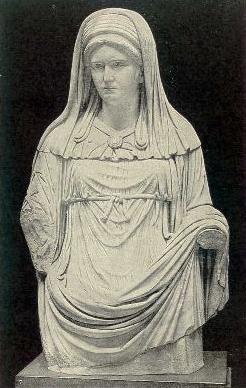
A veil is an article of clothing or hanging cloth that is intended to cover some part of the head or face, or an object of some significance. Veiling has a long history in European, Asian, and African societies. The practice has been prominent in different forms in Judaism, Christianity, and Islam. The practice of veiling is especially associated with women and sacred objects, though in some cultures, it is men, rather than women, who are expected to wear a veil. Besides its enduring religious significance, veiling continues to play a role in some modern secular contexts, such as wedding customs.
Thorn in the flesh is a phrase of New Testament origin used to describe an annoyance, or trouble in one's life, drawn from Paul the Apostle's use of the phrase in his Second Epistle to the Corinthians 12:7–9:
And lest I should be exalted above measure through the abundance of the revelations, there was given to me a thorn in the flesh, the messenger of Satan to buffet me, lest I should be exalted above measure. 8 For this thing I besought the Lord thrice, that it might depart from me. 9 And he said unto me, My grace is sufficient for thee: for my strength is made perfect in weakness. Most gladly therefore will I rather glory in my infirmities, that the power of Christ may rest upon me. (KJV)

A burqa or a burka is an enveloping outer garment worn by some Muslim women which fully covers the body and the face. Also known as a chadaree or chaadar in Afghanistan and Pakistan, or a paranja in Central Asia, the Arab version of the burqa is called the boshiya and is usually black. The term burqa is sometimes conflated with the niqāb even though, in more precise usage, the niqab is a face veil that leaves the eyes uncovered, while a burqa covers the entire body from the top of the head to the ground, with a mesh screen which only allows the wearer to see in front of her. The burqa should also not be confused with the hijab, a garment which covers the hair, neck and all or part of the chest, but does not cover the face.

Sarah is a biblical matriarch, prophet, and major figure in Abrahamic religions. While different Abrahamic faiths portray her differently, Judaism, Christianity, and Islam all depict her character similarly, as that of a pious woman, renowned for her hospitality and beauty, the wife and half-sister of Abraham, and the mother of Isaac. Sarah has her feast day on 1 September in the Catholic Church, 19 August in the Coptic Orthodox Church, 20 January in the LCMS, and 12 and 20 December in the Eastern Orthodox Church.
The Hittites, also spelled Hethites, were a group of people mentioned in the Hebrew Bible. Under the names בני-חת and חתי they are described several times as living in or near Canaan between the time of Abraham and the time of Ezra after the return of the Jews from the Babylonian exile. Their ancestor was Heth.
Islamic clothing is clothing that is interpreted as being in accordance with the teachings of Islam. Muslims wear a wide variety of clothing, which is influenced not only by religious considerations, but also by practical, cultural, social, and political factors. In modern times, some Muslims have adopted clothing based on Western traditions, while others wear modern forms of traditional Muslim dress, which over the centuries has typically included long, flowing garments. Besides its practical advantages in the climate of the Middle East, loose-fitting clothing is also generally regarded as conforming to Islamic teachings, which stipulate that body areas which are sexual in nature must be hidden from public view. Traditional dress for Muslim men has typically covered at least the head and the area between the waist and the knees, while women's islamic dress is to conceal the hair and the body from the ankles to the neck. Some Muslim women also cover their face. However, other Muslims believe that the Quran does not mandate that women need to wear a hijab or a burqa.
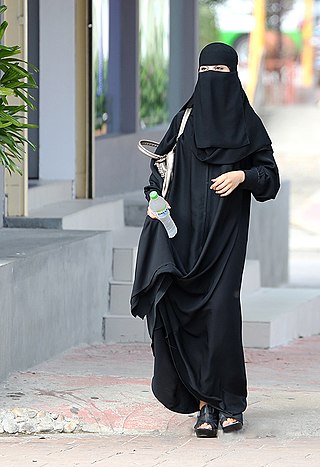
A niqāb or niqaab, also known as a ruband, is a long garment worn by some Muslim women in order to cover their entire body and face, excluding their eyes. It is an interpretation in Islam of the concept of hijab, and is worn in public and in all other places where a woman may encounter non-mahram men. Most prevalent in the Arabian Peninsula, the niqab is a controversial clothing item in many parts of the world, including in some Muslim-majority countries.
The term jilbāb refers to any long and loose-fit coat or outer garment worn by some Muslim women. Wearers believe that this definition of jilbāb fulfills the Quranic choice for a hijab. The jilbāb is also known as chador by Persian speakers in Iran and Afghanistan. The modern jilbāb covers the entire body. Some women will also cover the hands with gloves and the face along with a niqāb. In recent years, a short visor is often included to protect the face from the tropical sun.
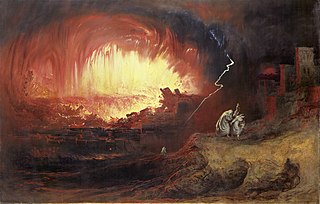
Vayeira, Vayera, or Va-yera is the fourth weekly Torah portion in the annual Jewish cycle of Torah reading. It constitutes Genesis 18:1–22:24. The parashah tells the stories of Abraham's three visitors, Abraham's bargaining with God over Sodom and Gomorrah, Lot's two visitors, Lot's bargaining with the Sodomites, Lot's flight, the destruction of Sodom and Gomorrah, how Lot's daughters became pregnant by their father, how Abraham once again passed off his wife Sarah as his sister, the birth of Isaac, the expulsion of Hagar, disputes over wells, and the binding of Isaac.

Matthew 5:39 is the thirty-ninth verse of the fifth chapter of the Gospel of Matthew in the New Testament and is part of the Sermon on the Mount. This is the second verse of the antithesis on the command: "eye for an eye". In one of the most famous verses in the New Testament, Jesus here rejects revenge and retaliation, instead telling his followers to turn the other cheek.
In biblical studies, the term wife–sister narratives in Genesis refers to three strikingly similar stories in chapters 12, 20, and 26 of the Book of Genesis. At the core of each is the story of a biblical patriarch who has come to be in the land of a powerful foreign overlord who misidentifies the Patriarch's wife as the Patriarch's sister, and consequently attempts to wed her himself. The overlord later finds out his error. Two of the three stories are similar in many other details, including the ruler's name, Abimelech.
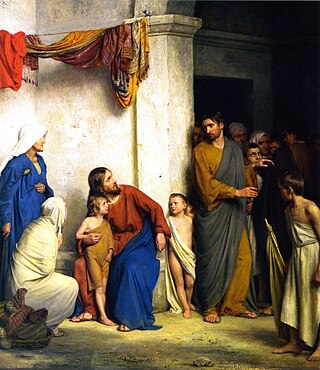
Jesus' teachings referring to little children and infants/babies appear in a few places in the New Testament and in the non-canonical Gospel of Thomas.

Christian head covering, also known as Christian veiling, is the traditional practice of women covering their head in a variety of Christian denominations. Some Christian women wear the head covering in public worship and during private prayer at home, while others believe women should wear head coverings at all times. Among Oriental and Eastern Orthodox Churches, certain theologians likewise teach that it is "expected of all women to be covered not only during liturgical periods of prayer, but at all times, for this was their honor and sign of authority given by our Lord", while others have held that headcovering should at least be done during prayer and worship. Genesis 24:65 records the veil as a feminine emblem of modesty. Manuals of early Christianity, including the Didascalia Apostolorum and Pædagogus, instructed that a headcovering must be worn by women during prayer and worship as well as when outside the home. When Saint Paul commanded women to be veiled in 1 Corinthians, the surrounding pagan Greek women did not wear headcoverings; as such, the practice of Christian headcovering was countercultural in the Apostolic Era, being a biblical ordinance rather than a cultural tradition. The style of headcovering varies by region, though Apostolic Tradition specifies an "opaque cloth, not with a veil of thin linen".

Psalm 141 is the 141st psalm of the Book of Psalms, beginning in English in the King James Version: "LORD, I cry unto thee: make haste unto me". In the slightly different numbering system used in the Greek Septuagint version of the Bible, and the Latin Vulgate, this psalm is Psalm 140. In Latin, it is known as "Domine clamavi ad te exaudi me". It is attributed to David, a plea to God not only for protection from the psalmist's enemies, but also from temptation to sin. This psalm contains a prayer for deliverance from 'the enticements and the oppression of the wicked', and seeks 'divine support to live a sinless life', probably a prayer of an ordinary worshipper, although it has some indications for being a "king's psalm" offered during 'a military campaign far away from Jerusalem'.
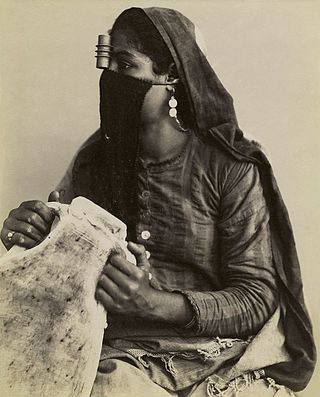
In a predominantly Muslim society, as many as 90% of women in Egypt have adopted a form of veiling. A majority of Egyptian women cover at least their hair with the hijab. A hijab refers to a head covering that is worn by Muslim women. Although the phenomenon of wearing the niqāb, a veil which covers the face is not as common, the niqab in Egypt has become more prevalent. While a few women in Egypt wear a black niqab along with a billowing black abaya as seen in countries such as Saudi Arabia, many choose to wear different colors of the niqab or manipulate the hijab to cover their face. Regardless, the growing trend of munaqqabat, or women who wear the niqab, has alarmed the authorities. They have begun to see this dress as a security threat, because it hides the face, and because it is perceived as a political statement, a rejection of the state in favor of a strict Islamic system.

Rebecca appears in the Hebrew Bible as the wife of Isaac and the mother of Jacob and Esau. According to biblical tradition, Rebecca's father was Bethuel the Aramean from Paddan Aram, also called Aram-Naharaim. Rebecca's brother was Laban the Aramean, and she was the granddaughter of Milcah and Nahor, the brother of Abraham. Rebecca and Isaac were one of the four couples that some believe are buried in the Cave of the Patriarchs, the other three being Adam and Eve, Abraham and Sarah, and Jacob and Leah.
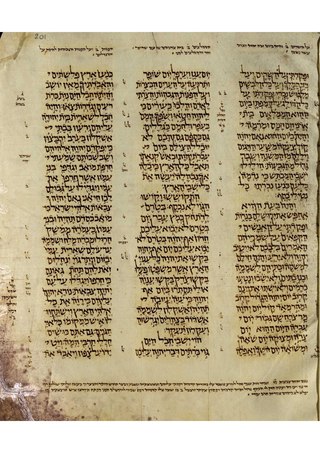
Zechariah 9 is the ninth of the 14 chapters in the Book of Zechariah in the Hebrew Bible or the Old Testament of the Christian Bible. This book contains the prophecies attributed to the prophet Zechariah, and is a part of the Book of the Twelve Minor Prophets. This chapter is a part of a section consisting of Zechariah 9–14. It concerns the advance of an enemy, but God defends Jerusalem and his king will triumphantly enter the city to bring peace among all nations. This chapter also contains a continuation of the subject in the seventh chapter. The part about the king's entry into Jerusalem is quoted in the New Testament, especially in the event of Jesus' triumphal entry into Jerusalem.
References
![]() This article incorporates text from a publication now in the public domain : Easton, Matthew George (1897). Easton's Bible Dictionary (New and revised ed.). T. Nelson and Sons.
This article incorporates text from a publication now in the public domain : Easton, Matthew George (1897). Easton's Bible Dictionary (New and revised ed.). T. Nelson and Sons.{{cite encyclopedia}}: Missing or empty |title= (help)
- ↑ Covering of the eyes in The Illustrated Bible Dictionary, Third Edition, by Matthew George Easton M.A., D.D, 1897
- ↑
 This article incorporates text from a publication now in the public domain : Kaufmann Kohler (1901–1906). "Atonement". In Singer, Isidore; et al. (eds.). The Jewish Encyclopedia . New York: Funk & Wagnalls.
This article incorporates text from a publication now in the public domain : Kaufmann Kohler (1901–1906). "Atonement". In Singer, Isidore; et al. (eds.). The Jewish Encyclopedia . New York: Funk & Wagnalls. - ↑ Niqāb - Introduction BBC - Religion and Ethics. 16 October 2003. Retrieved 14 April 2007.
- ↑ Matter of Choice BBC - Religion and Ethics. 16 October 2003. Retrieved 14 April 2007.
- ↑ "Saudi cleric favours one-eye veil". BBC. 3 October 2008. Retrieved 2008-06-02.